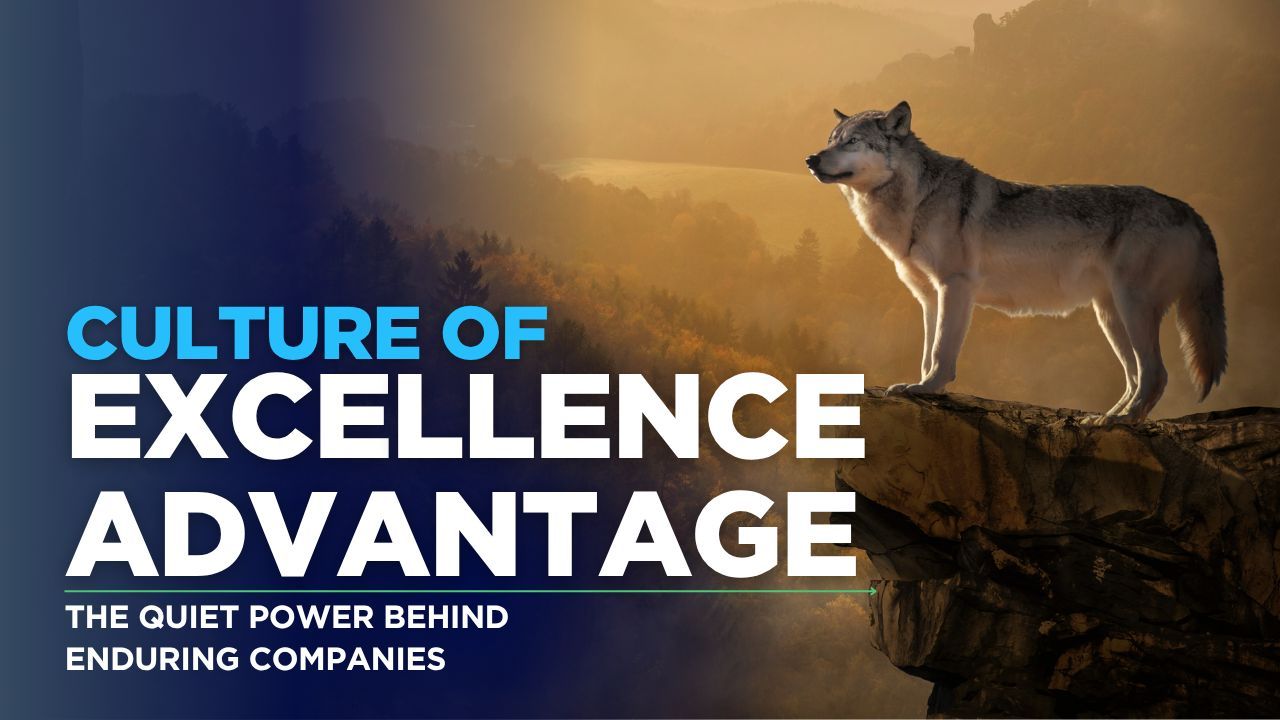Culture of Excellence Advantage - The Quiet Power Behind Enduring Companies
Aug 07, 2025
"Success without succession is failure in disguise." - Peter Drucker
In the lifecycle of every visionary company, there comes a sobering moment: the realization that the founder will one day step away. Whether by sale, succession, or time, the leader who sparked the flame will eventually hand off the torch. What happens next is not a logistical question; it’s a cultural one.
Even the best processes, most profitable models, and loyal customer base can crumble if one thing fades: the culture.
The Silent Threat to Legacy
Many leaders believe they’ve “systemized” their business to last. But history and the business graveyard are full of once-great companies that lost their soul as soon as the founder stepped away. Not because of bad people or poor strategy. But because no one truly protected the culture.
Culture drift happens slowly. Subtly. Silently. One misaligned hire. One shortcut. One compromised value. And before you know it, the very essence that made your company great becomes diluted, replaced by bureaucracy, ego, or empty performance metrics.
The antidote? Build a culture of excellence so strong, it outlives you.
What Does That Actually Look Like?
We’re not talking about motivational posters or team-building retreats. We’re talking about deep, operationalized values that become part of the way your business breathes. Here’s how enduring businesses do it and what we can learn from them.
1. A Vision So Strong, It’s Practically Immortal
Clarity of purpose is the ultimate compass.
When Jeff Bezos launched Amazon, he didn’t just build an e-commerce site; he embedded a vision of relentless customer obsession. His original 1997 shareholder letter still guides Amazon today, over 25 years later. That letter is reprinted in every annual report, reminding leaders and employees of the founding DNA.
Lesson: Your vision must be clear enough to guide decisions when you’re not in the room and strong enough to inspire belief for decades.
2. A Mission That Beats Like a Heart
Your mission should be felt, not just framed.
Mission isn’t what’s printed on the wall. It’s what drives behavior when no one’s watching. Like the human heart, it needs rhythm, reinforcement, and room to breathe. Businesses that endure make the mission part of onboarding, meetings, promotions, and even performance reviews.
Ask yourself: Is our mission still beating in the hearts of our people? Or has it flatlined into corporate jargon?
3. Clear Direction, Clear Standards
Great cultures don't rely on charisma. They run on clarity.
Jack Welch’s GE had a legendary reputation for operational excellence and cultural clarity. But behind the results was a ruthless commitment to clear expectations. Welch once said, “If you don’t have a competitive advantage, don’t compete.” That mindset was embedded into how GE hired, fired, and promoted.
Takeaway: Rules, standards, and non-negotiables are not limiting; they’re liberating. They free your team to act with confidence.
4. Simplicity That Scales
If your systems require you to explain them… they’ll die without you.
Walgreens didn’t scale by building complex systems. They scaled by making simplicity sacred. In Good to Great, Jim Collins explains how Walgreens’ leadership created systems so clear that even after multiple CEO transitions, the essence of the business stayed intact.
Key idea: Simplicity isn’t laziness. It’s legacy insurance.
5. Protect the System - Not Your Ego
Ego builds empires. Humility builds ecosystems.
Steve Jobs' departure and eventual return to Apple highlighted a painful truth: brilliance without systems is brittle. But Apple’s strength today isn’t just the memory of Jobs, it’s the culture of design excellence, innovation, and user-first thinking that’s embedded in every process.
Even after Jobs passed away, Apple didn’t lose its edge because it wasn’t built around one man’s ego. It was built around principles that transcended him.
Leadership Test: Are you building a business that protects your way of thinking… or a business that protects what matters most to the people you serve?
The Real Legacy: Culture That Breathes Without You
If your company culture only works when you’re in the building, then you’re not building a legacy. You’re building a dependency.
The businesses that change the world are the ones whose culture becomes contagious. Where people internalize the values not because they have to, but because they want to. Where leaders rise not because of loyalty to the founder, but loyalty to the mission.
This isn’t about control. It’s about continuity.
This isn’t about process. It’s about purpose.
Five Final Questions Every Legacy-Driven Founder Must Ask:
- Would my people make the same decisions I would - without calling me?
- Are our values operationalized - or just aspirational?
- Can our systems scale, or do they collapse without me?
- Have I defined “excellence” clearly enough for someone else to protect it?
- Am I building a culture of alignment - or a culture of dependency?
In the End, It’s Not About You
The ultimate measure of success isn’t whether your business outgrows you.
It’s whether it outlasts you.
Because true legacy isn’t built by brilliance. It’s built by alignment. By systems, values, and a culture so deeply rooted that generations feel it, even if they never knew your name.
When that happens… You haven’t just built a business. You’ve shaped the future.

